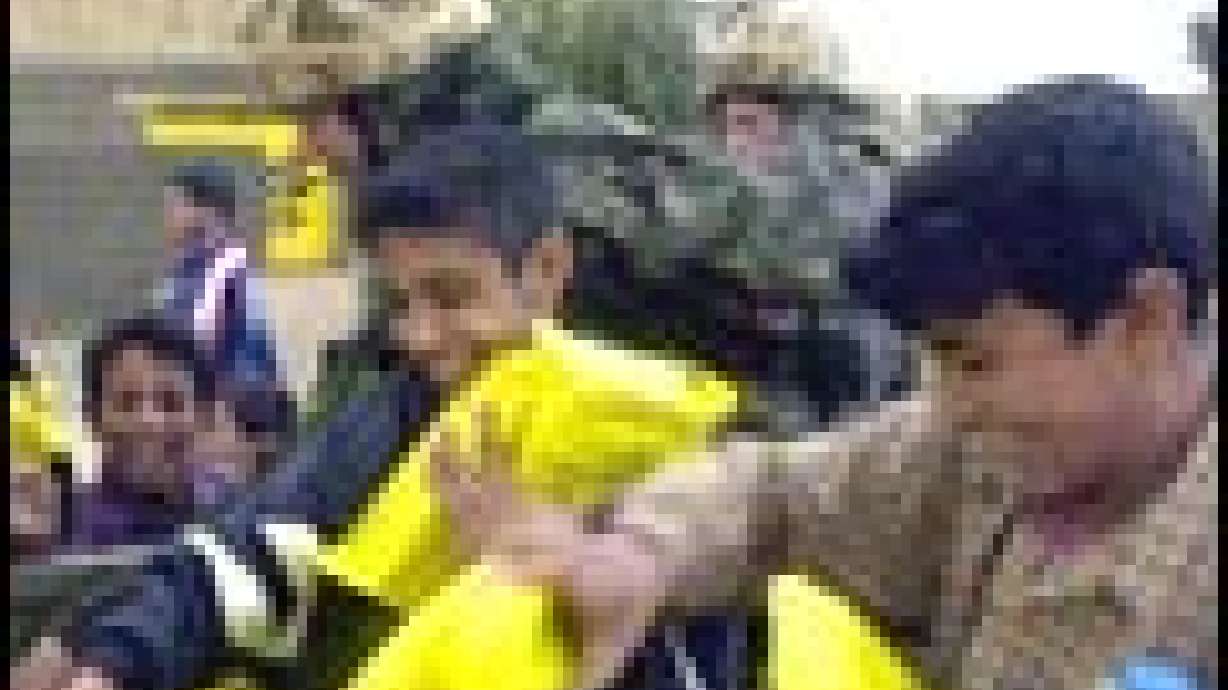Estimated read time: 5-6 minutes
This archived news story is available only for your personal, non-commercial use. Information in the story may be outdated or superseded by additional information. Reading or replaying the story in its archived form does not constitute a republication of the story.
ON BOARD RFA SIR GALAHAD (AP) -- British officials reluctantly postponed the start of a seaborne relief operation Thursday after discovering Iraqi mines in the shipping channel leading to the recently captured Iraqi port of Umm Qasr.
Air Marshal Brian Burridge, commander of British forces in the Persian Gulf, said two mines were discovered and detonated Wednesday during a sweep of the waterway by Royal Navy divers, who were being assisted by mine-detecting dolphins.
Burridge said further sweeping would be needed before waiting ships can dock at Umm Qasr with thousands of tons of food and other supplies for distribution to civilians in southern Iraq.
The Sir Galahad, a British Royal Navy ship loaded with humanitarian supplies, would not be able to reach port and deliver food supplies until Friday, said the ship's captain, Roger Robinson-Brown.
"This port is fundamental to the feeding of the country," he said.
The newly discovered mines can be programmed to count the number of hulls that pass over them and detonate at certain point, U.S. Brig. Gen. Vincent Brooks told a briefing at Central Command in Qatar. Iraq developed the mines "from another country's designs" even after U.N. sanctions had been imposed, Brooks added.
"Before 1991, Iraq did not have these," he said.
A first trickle of U.S. and British food and water has reached civilians in the region -- arriving via a seven-truck convoy Wednesday from Kuwait. Beyond Iraq's western border in Jordan, thousands more tons of grain have piled up in warehouses, mountains of white sacks waiting for what may be history's biggest humanitarian operation.
Crowds mobbed two British water tanker trucks that entered the port city of Umm Qasr on Wednesday. "Not enough, please! We need a good water supply," one man told British officers.
In the nearby town of Safwan, a five-truck Kuwaiti Red Crescent Society convoy, loaded with 45,000 boxes of food, was swarmed by hundreds of Iraqis, many of them shoeless, dirty young men who fought over the white boxes as soon as the truck doors opened.
That kind of desperation, and the televised scenes of wartime havoc from Baghdad to Basra, made it clear that an urgent need was building.
"We can spring into action with 48 hours' notice," relief official Khaled Mansour, in Jordan, said of an ambitious U.N. plan to rush massive amounts of food aid into Iraq.
Aid agencies have long warned of a humanitarian crisis in Iraq, where 12 years of economic sanctions have left some 60 percent of the 22 million people dependent on government rations distributed under the U.N.'s oil-for-food program.
The program, which began in 1996, allows Iraq to sell unlimited quantities of oil to buy food, medicine and other humanitarian goods.
As Iraq's only deep water port, Umm Qasr is critical for both military and humanitarian operations in the war.
Several ships, including a British naval ship carrying humanitarian supplies and two Australian merchant vessels each carrying 55,000 tons of wheat, were waiting to head into the port.
But first the U.N. teams need secure zones in which to operate, and much depends on a debate a half-world away in New York, where U.N. diplomats dueled over the finances and politics of the Iraq relief effort.
The governments that earlier this month blocked U.N. authority for the U.S.-British invasion want Washington to bear the financial burden of feeding and rehabilitating Iraq.
Aid professionals said it would be a mistake for the U.S. military, as a combatant, to try to oversee aid distribution long term.
"Only civilian organizations specializing in humanitarian relief can make impartial distribution of aid supplies," said David Wimhurst, of the U.N. office on Iraq, speaking in Amman, the Jordanian capital.
The U.N. humanitarian agencies are expected on Friday to appeal for $1.9 billion from donor nations for their planned gigantic relief program, which many governments will expect Washington and London to largely finance. More than half will go toward food.
The agencies' earlier, prewar appeal for $120 million didn't draw even half that amount. Of the $47 million in contributions earmarked for the World Food Program, $40 million came from the United States, Mansour said.
The U.N. food program has thus far stockpiled 30,000 tons of wheat, rice and other food in countries surrounding Iraq, he said, a small fraction of what might be needed.
Trucks laden with sacks of grain pull in daily at two WFP warehouses in Juweideh, Jordan, a hilly town outside Amman, where the pallet-loads are stacked 20 feet high.
"We can fill this place with 6,000 tons," said warehouse manager Mohammed Abu Khadra. "I'll stack them to the ceiling if I have to."
The World Food Program intends to temporarily take over the Iraqi government's vitally important food-rationing system, which fully feeds 60 percent of the population and partly supplies the rest.
It was believed to be the biggest such government program worldwide: Some 400,000 tons of food imported each month distributed through 43,000 authorized shops, or agents -- typically wheat flour, rice, vegetable oil, beans and milk.
The war has now stopped food imports, Iraq's warehouses are emptying, and most Iraqi families are believed to have food to last only into late April. The agencies fear a humanitarian disaster -- particularly, for example, for the one-quarter of Iraqi children under age 5 suffering from chronic malnutrition.
The World Food Program hopes to get into Iraq and take over the rationing system before late April, and then run it for probably four to six months.
(Copyright 2003 by The Associated Press. All Rights Reserved.)








